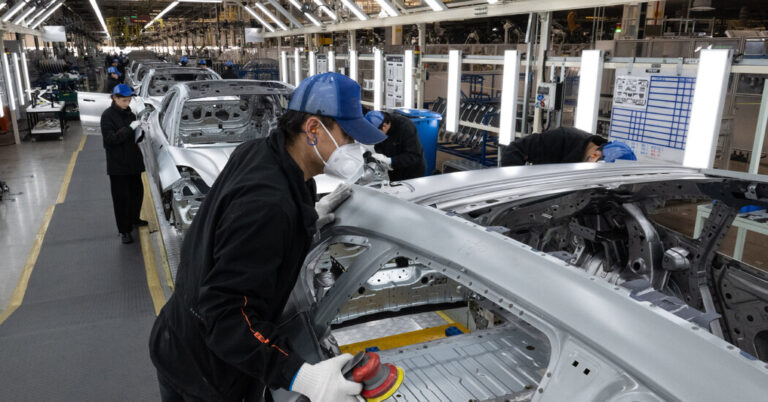China threatened to impose tariffs on pork imports from Europe on Monday, in an apparent response to the European Union’s decision last week to impose provisional tariffs on electric vehicle imports from China.
China’s Commerce Ministry said it has launched an investigation into whether European Union pork is being dumped in China at unfairly low prices, a case that could lead to tariffs on dozens of products, from pork fillets to pickled pork intestines.
The ministry said it was acting on a request from the China Animal Agriculture Association, a government-backed group that released a copy of the request, which accused Europe’s overcapacity-ridden pork industry of benefiting from inappropriate government subsidies — the same accusations made by European and U.S. officials against China’s auto industry.
European Commission spokesman Olof Gill said in a statement that the EU’s executive agency was analyzing China’s actions and “will follow the procedure very closely, in coordination with EU industry and member states, and will intervene as appropriate to ensure that the investigation is fully compliant with the relevant World Trade Organization rules.”
The China-European Union Chamber of Commerce, a business group, said in a statement that China’s action was not unexpected after the European Union recently imposed tariffs on electric vehicles. The chamber added that it “encourages both sides to take action to depoliticize the business environment and find ways to address the underlying causes.”
EV tariffs have been a divisive issue in Europe. Labor unions and European auto parts makers worry about job losses as Chinese EV exports to Europe surge. But European automakers such as Volkswagen are expanding EV production in China and shifting purchases from Europe to lower-cost Chinese suppliers. They worry that the trade dispute could lead China to target European luxury car imports next.
By opting for pork imports in return for tariffs on electric vehicles, China is turning to a strategy it followed during its last major trade war with the European Union more than a decade ago.
In 2013, the European Union moved to impose an 11.8% tariff on solar panels imported from China. China responded by threatening to impose tariffs on European wines, then launched a successful campaign to persuade European governments to make concessions from EU leaders in Brussels.
Farmers are a powerful political lobby in Europe and have been exploring ways to increase sales to China, and experts on Chinese trade policy said Beijing may be trying to pressure the European Union to make concessions again.
In addition to the pork trade case, the Commerce Department has already launched a case in January against imports of cognac and other European wine-based spirits, mostly from France. The French government has been an early supporter of tariffs on Chinese-made electric vehicles following allegations that China has heavily subsidized the electric vehicle industry.
It’s unclear whether China will be able to block the European Union’s electric vehicle tariffs. After the European Union withdrew its tariffs, Chinese solar panel imports dealt a devastating blow to Europe’s solar panel manufacturing industry. European governments are still looking for ways to revive the industry. Few in Europe want to see electric vehicle production suffer a similar fate.
China also has a huge trade surplus with Europe: in recent months, China has been sending Europe four containers of exports for every one container of imports it has sent there.
For China, pork tariffs could help protect a vital industry from international competition. Pork prices fell 14 percent last year as Chinese farmers increased their herds. Prices began to recover last month but are still half what they were three to five years ago, when African swine fever epidemics killed most of China’s pigs.
China is by far the world’s largest market for pork, a staple food, with per capita consumption reaching about a quarter of a pound per day in some provinces, such as Hunan.
China has yet to retaliate against the Biden administration’s decision in early May to raise tariffs on electric vehicles, lithium batteries and other Chinese products. China has criticized the U.S. tariffs but has refrained from the rapid escalation of retaliatory tariffs it pursued under the Trump administration. That approach backfired for Beijing in 2018 and 2019, when the Trump administration quickly expanded the tariffs, many of which have remained in place ever since.
China now imports far fewer products from the United States after years of government-led efforts to reduce its dependence on imports, limiting its options for far-reaching retaliation.
Li Yu contributed to the research.

